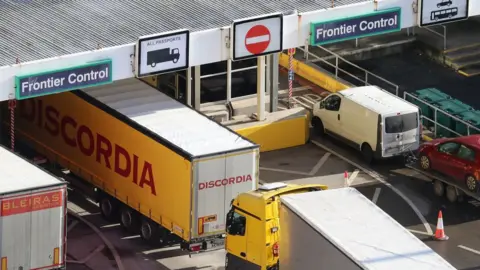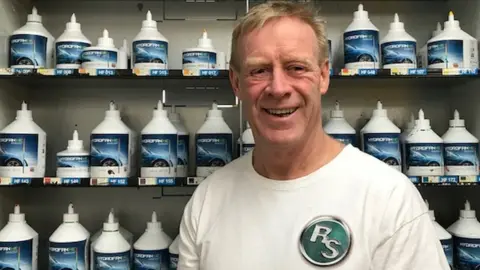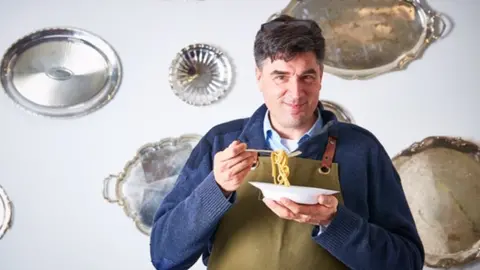Post-Brexit trade: 'If you don't speak French, you're stuffed'
 PA Media
PA MediaMore than a month after the UK's post-Brexit trade deal with the EU came into force, complaints from British importers and exporters continue to mount.
Rules of origin for products that are imported into the UK, then exported to the EU are causing difficulty for some firms.
Others are caught up in the complexity of VAT issues, while the time and trouble taken to get merchandise through customs remains a hassle.
Small wonder, then, that according to a survey by the Road Haulage Association, Brexit-related problems caused the volume of exports passing through British ports to the EU to fall very sharply last month compared with a year ago.
A government spokesperson admitted that some businesses are "facing challenges with specific aspects of our new trading relationship" and promised to provide them with the necessary support "to trade effectively with Europe".
"That's why we are operating export helplines, running webinars with experts and offering businesses support via our network of 300 international trade advisers," the spokesperson said.
The BBC spoke to three of the firms affected to learn more about the particular challenges they are facing.
Rules of origin: 'We have to take a hit'
 Nisha Menon
Nisha Menon"We have to take a hit and blindly support our customers," says Nisha Menon, whose company, Nikasu Foods, specialises in Indian snacks and meals.
It's a family-run firm, started by her father 25 years ago. She took over the UK and European side of the business 12 years ago.
Her headaches began when the company that distributes her products in Greece complained about having to pay extra to receive its latest consignment of Jack & Chill jackfruit products.
These are vegan-friendly meals, including spicy burgers and biryanis, that are gaining popularity in the Greek market.
But like all the firm's foodstuffs, they are manufactured at its two factories in India - and that's where the problem lies.
Naturally, Nisha had to pay duty on the goods when they arrived in the UK. In the past, that would have been it, but now there is an additional tariff barrier.
"Apparently because the product is not made in the UK, they now have to pay customs duty when they import it into Greece," Nisha says.
"They said, 'We cannot increase the price, so you have to support us with that.'"
One solution would be to send the products directly from India to Greece, but because they are shipped in big containers, that would involve a minimum order of 10 tonnes, which is too much for the distributor to handle.
"I'm very frustrated," says Nisha, who is now considering dropping the EU market altogether.
"I've been told I don't have to pay duty again, but the Greek customs don't agree."
VAT and duties: 'There's a limit to how much we can write off'
 Phil Allen
Phil Allen"Bikers are notoriously fussy about getting the right colour paint match for their bikes," says Phil Allen, managing director of RS Bike Paint.
And if you're a motorcyclist who wants to be sure of getting the right paint job to complete a repair, Phil has the solution.
His company has 45,000 records of different paint shades covering 160 different bike brands. It's the only comprehensive database of its kind.
"It's a niche market that's about an inch wide, but a mile deep," he says. "Nobody else does what we do."
However, it turns out there is a limit to how far his customers are prepared to go.
Phil says that for the first few weeks of January, his customers were paying VAT twice - once when they purchased items online, then again to release their products from customs in their own country, together with an admin fee.
"This has since been rectified and we are not charging VAT at the point of order, so our customers are not being charged this tax twice.
"It doesn't, however, eradicate the nightmare of cross-border fees, brokerage fees and delays of up to six weeks where the product sits forgotten in overseas warehouses."
The effects are already being felt. One Frenchman placed an order worth €54 - that's €40 worth of paint. plus a €14 shipping charge. But when he was asked to pay another €39 in charges, he declined.
"Now that the goods are in France, we can either pay the carrier to bring them back to us or have the product destroyed. It's cheaper for them to be destroyed."
Phil's website asks EU customers to agree to pay any duties, but he can't tell them in advance what those will be, because different countries are applying the rules differently and inconsistently.
"One-third of everything we manufacture goes straight to the EU," he says. "There's a limit to how much we can write off."
Customs clearance: 'What's going on is highway robbery'
 Nicolas Hanson
Nicolas Hanson"If you don't speak French, you're stuffed," says Nicolas Hanson, managing director of high-end pasta-making firm La Tua Pasta. Fortunately he does, having dual British and French citizenship.
That has allowed him to carry on sending truffle ravioli and other delicacies to top retailers on the other side of the Channel, having forged contacts that have safeguarded his supply route in the face of increasing bureaucracy.
That trade has become all the more valuable to him as demand from posh UK restaurants has withered during the pandemic.
But since 1 January, new demands for paperwork have saddled him with an extra £50,000 to £75,000 in costs.
These include the need to obtain a public health certificate for his products and inspections from two sets of vets, one in the UK and one in France, for every shipment he sends.
These Product of Animal Origin rules apply not just to meat, but to all foodstuffs that contain 50% or more processed dairy product, eggs or milk.
"It's not uncommon for the truck driver to call me at 8pm on a Saturday night from Calais," he says.
"There are never enough vets, so we can wait for four hours. Every hour we wait costs £50. Then the truck driver has worked his shift and needs eight hours' rest time."
At every step of the way, there are officials who need to be paid. "What's going on is highway robbery. Everyone has got their snout in the trough."
Nicolas says his customers will have to pay more because of the extra costs: "I will absorb some, they will absorb some and we will have to live with it.
"But frankly, it's scandalous that the governments are allowing this to happen. We're just a food manufacturer trying to make a living."
